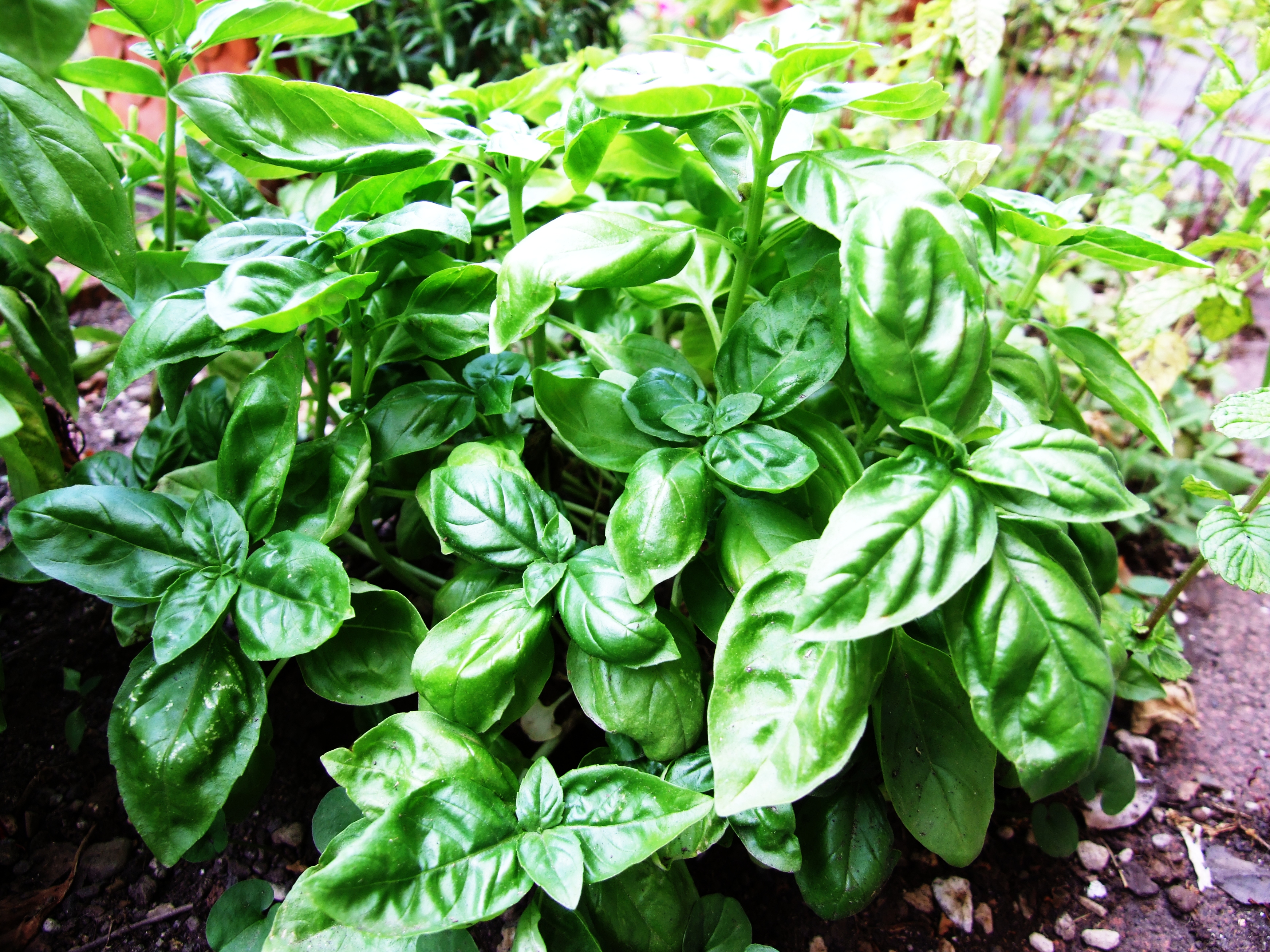Tuesday, July 2, 2013
Health Benefits of Basil
Basil (Ocimum basilicum) is a culinary herb prominently featured in Italian and Southeast Asian cuisines. While many varieties of basil exist, sweet basil is one of the most predominant and most frequently examined herbs for its health benefits. Basil is originally native to Iran, India, and other tropical regions of Asia, but now it is widely available throughout the world. Basil’s antioxidant, antimutagenic, antitumorigenic, antiviral, and antibacterial properties likely arise from a variety of components including linalool, 1,8-cineole, estragole, and eugenol (Muller et al. 1994; Chiang et al. 2005; Makri and Kintzios 2007).
There is evidence that basil can decrease induced carcinogenesis. Providing Swiss mice with a diet containing 150 or 300 mg/kg body weight of basil extract decreased DMBA-induced skin tumors (12.5% reduction and 18.75% reduction for lower and higher doses, respectively), and lowered the tumor burden per mouse. Compared to the average number of tumors per mouse in the controls, the tumor burden was approximately 2.4 times lower in the low-dose basil group and 4.6 times lower in the high-dose basil group (Dasgupta, Rao, and Yadava 2004).
The anticancer properties of basil may also relate to its ability to influence viral infections. Individuals with hepatitis B are recognized to be at increased risk for hepatocellular carcinoma (Fung, Lai, and Yuen 2009; Ishikawa 2010). Chiang et al. (2005) evaluated the antiviral activities of basil extract and selected basil constituents in a human skin basal cell carcinoma cell line against several viruses, including hepatitis B.
There are many rituals and beliefs associated with basil. The French sometimes call basil "l'herbe royale", while in Welsh it has the synonymous name "brenhinllys". Jewish folklore suggests it adds strength while fasting. In Portugal, dwarf bush basil is traditionally presented in a pot, together with a poem and a pom-pon, to a sweetheart, on the religious holidays of Saint John and Saint Anthony. However, basil represented hatred in ancient Greece, and European lore sometimes claims that basil is a symbol of Satan[citation needed]. African legend claims that basil protects against scorpions, while the English botanist Culpeper cites one "Hilarius, a French physician" as affirming it as common knowledge that smelling basil too much would breed scorpions in the brain.
Holy basil, also called tulsi, is highly revered in Hinduism. It is believed that the herb was found growing on the original cross of Christ when it was discovered by the Empress Helena, and hence basil has religious significance in the Greek Orthodox Church, where it is used to sprinkle holy water.[31] The Bulgarian Orthodox Church, Serbian Orthodox Church, Macedonian Orthodox Church and Romanian Orthodox Church use basil (Bulgarian and Macedonian: босилек; Romanian: busuioc, Serbian: босиљак) to prepare holy water and pots of basil are often placed below church altars.
In Europe, basil is placed in the hands of the dead to ensure a safe journey.[citation needed] In India, they place it in the mouth of the dying to ensure they reach God.[citation needed] The ancient Egyptians and ancient Greeks believed it would open the gates of heaven for a person passing on.
In Boccaccio's Decameron a memorably morbid tale (novella V) tells of Lisabetta, whose brothers slay her lover. He appears to her in a dream and shows her where he is buried. She secretly disinters the head, and sets it in a pot of basil, which she waters with her daily tears. The pot being taken from her by her brothers, she dies of her grief not long after. Boccaccio's tale is the source of John Keats' poem Isabella or The Pot of Basil - which in turn inspired the paintings Isabella (Millais painting) and Isabella and the Pot of Basil. A similar story is told of the Longobard queen, Rosalind.
source: http://preventdisease.com/ and http://en.wikipedia.org/
Labels:
article,
health benefit
Subscribe to:
Post Comments (Atom)

ReplyDeletestill don’t know the right words to express my Gratitude to the Great Dr.Lusanda After been diagnosed of hepatitis in 2014, i was given so many health prescription and advice with no improvement, I totally lost hope, until i found testimonies of Great Dr. Lusanda in an online research and on Facebook, Like anybody would be, I was very skeptical about contacting him, but i later did email him and he started the remedies for my health. Thank God, i was cured from hepatitis by the herbal medication I received from him. I never thought that hepatitis can be cured, from the bottom of my heart I’m truly grateful,i pray you have long life so you can help many more people on earth with your herbal medical support. Contact Lusanda today, Email: Drlusandaherbal@gmail.com or www.drlusandaherbal.weebly.com